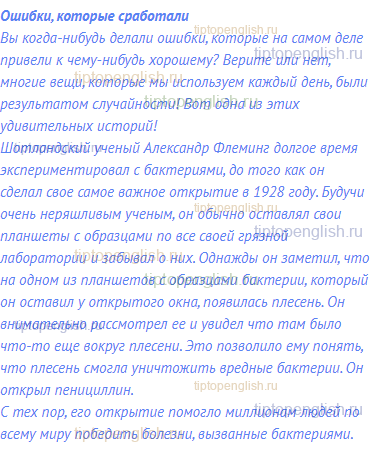ГДЗ Английский язык за 8 класс Ваулина - Spotlight - УчебникModule 3 – 3c – 1
Mistakes that worked
Have you ever made a mistake that actually turned out to be something good? Believe it or not, a lot of things we use every day were a result of accidents! Here is one of these amazing stories!
Scottish scientist Alexander Fleming had been experimenting with bacteria for a long time before he made his most important discovery in 1928. Being a very sloppy scientist, he used to leave his culture plates all around his messy lab and then forget about them. One day he noticed that there was some mould on one of the bacteria samples he had left by an open window. He took a closer look and saw that there was something around the mould. This made him realise that the mould was able to destroy harmful bacteria. He had discovered penicillin.
Since then, his discovery has helped millions of people around the world recover from illnesses caused by bacteria.
We use the Past Perfect (had + past participle) for
Она была расстроена, потому что она провалила свой тест.
We use the Past Perfect Continuous (had + been + -ing form) for
had been experimenting for a long time before he made
had left
had discovered
ГДЗ - "Spotlight - Учебник"
по предмету Английский язык за 8 класс.
Год издания
2019
Aвторы
Дули Д., Эванс В., Подоляко О.Е., Ваулина Ю.Е.
Задание
Mistakes that worked Have you ever made a mistake that actually turned out to be something good? Believe it or not, a lot of things we use every day were a result of accidents! Here is one of these amazing stories! Scottish scientist Alexander Fleming had been experimenting with bacteria for a long time before he made his most important discovery in 1928. Being a very sloppy scientist, he used to leave his culture plates all around his messy lab and then forget about them. One day he noticed that there was some mould on one of the bacteria samples he had left by an open window. He took a closer look and saw that there was something around the mould. This made him realise that the mould was able to destroy harmful bacteria. He had discovered penicillin. Since then, his discovery has helped millions of people around the world recover from illnesses caused by bacteria. Ошибки, которые сработали Вы когда-нибудь делали ошибки, которые на самом деле привели к чему-нибудь хорошему? Верите или нет, многие вещи, которые мы используем каждый день, были результатом случайности! Вот одна из этих удивительных историй! Шотландский ученый Александр Флеминг долгое время экспериментировал с бактериями, до того как он сделал свое самое важное открытие в 1928 году. Будучи очень неряшливым ученым, он обычно оставлял свои планшеты с образцами по все своей грязной лаборатории и забывал о них. Однажды он заметил, что на одном из планшетов с образцами бактерии, который он оставил у открытого окна, появилась плесень. Он внимательно рассмотрел ее и увидел что там было что-то еще вокруг плесени. Это позволило ему понять, что плесень смогла уничтожить вредные бактерии. Он открыл пенициллин. С тех пор, его открытие помогло миллионам людей по всему миру победить болезни, вызванные бактериями. Read the theory. Are there similar structures in your language? Find examples in the text above. Прочитайте теорию. Есть похожие структуры в вашем языке? Найдите примеры в тексте, данном выше.














